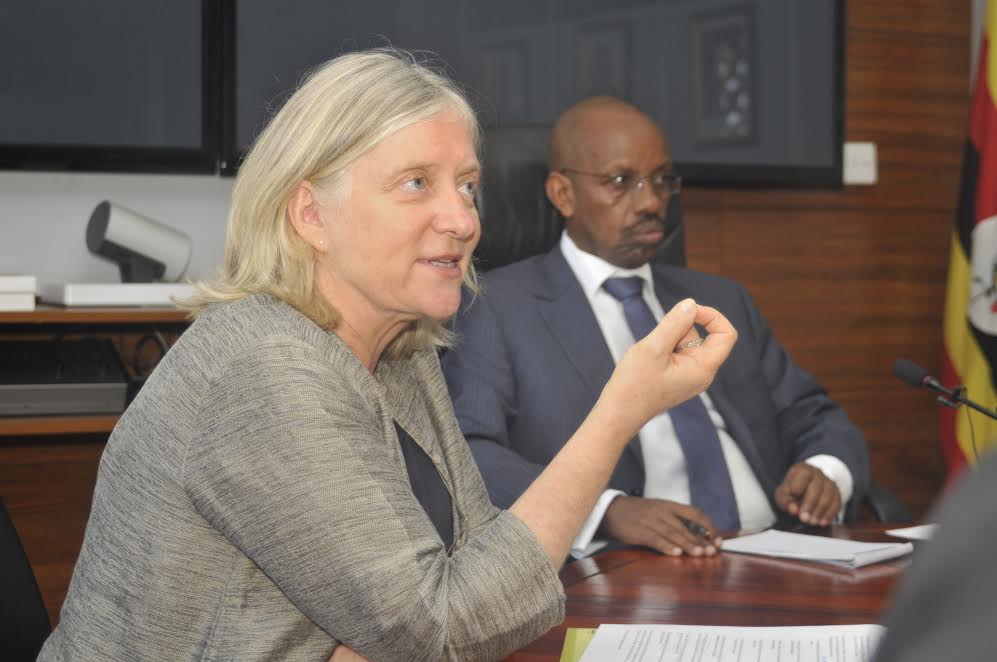The World Bank has lifted the suspension of new lending to Uganda after about 10 months.
In August 2016, the Bank suspended lending to Uganda due to numerous reasons including failure to kick start projects in time, poor absorptive capacity, corruption, mismanagement of projects, inability to do feasibility, social and environmental studies as well as human rights abuses in project areas.
The World Bank Country Manager, Christina Malmberg Calvo, disclosed the lifting of the suspension at a press conference held today, Monday at the Ministry of Finance headquarters. Calvo said lifting of the lending suspension followed improvement in government’s management of portfolio of active projects, 22 in total.
Calvo said starting June, two new projects will be taken to the Bank’s board for approval. The first one is supporting government and civil society effort in combating violence against women and children and the other- on strengthening fiscal decentralization in education and health sectors.
Calvo said going forward, annual financial disbursements to Uganda will increase, suggesting improvement in absorptive capacity of Uganda than in previous years.
The Permanent Secretary in the Ministry of Finance, Keith Muhakanizi, said they are strengthening feasibility of projects, adding that a policy document on the same is in the works.
As a rejoinder, the World Bank Country Manager said they are in full support of feasibility of all projects to ensure proper preparation through the entire project cycle.
On the sluggish economic growth rate for 2016/17 fiscal year, Calvo said the World Bank is in agreement with the subdued economic outlooks revealed by the International Monetary Fund last week. The IMF reduced Uganda’s economic growth in the short-term to 3.5 percent despite earlier projections that Uganda’s economy would grow between five and 5.5 percent.
Open Day
Meanwhile, The World Bank Group and Government of Uganda will hold an Open Day for the general public on May 30, 2017. The event, “Partnering for Development,” will take place at Kololo Independence Grounds (airstrip) from 8am to 5pm.
An exciting array of activities will run throughout the day, including presentations and panel discussions on topical development issues, quizzes and competitions, photo exhibitions, tutorials, and lots of other performances illustrating the World Bank’s partnership. More than 50 Ugandan government agencies will be showcasing their work and explaining how it is improving the lives of citizens throughout the country. Representatives of the Government of Uganda and officials from the World Bank Group will be available all day to interact with the public, share information, and exchange views.
“The Open Day will be an opportunity to learn more about our work in the country and discuss how our support can have a positive impact on the lives of Ugandans,” said Calvo. “We look forward to welcoming the general public in large numbers.”
Through its new Country Partnership Framework, the World Bank Group is supporting Uganda to raise rural incomes through agricultural commercialization and support to poor and vulnerable Ugandans. The Bank Group promotes inclusive growth in urban areas, and private sector competitiveness and investments in planning and infrastructure. With other partners, it supports the Government of Uganda to improve health and education, economic governance, and fiscal management.
“The Government of Uganda has had a long-standing partnership with the World Bank Group,” said Hon. Kasaija. “For more than 50 years, together we have brought development to millions of Ugandans. As a result, social and infrastructure services have improved. Poverty has come down and will continue to do so.”
The World Bank Group’s portfolio in Uganda is worth close to US$3 billion in credits, grants, and guarantees covering national and regional operations. About half of this supports infrastructure development—energy, roads, urban infrastructure, and ICT—and the rest agriculture, water and sanitation, education and health, social protection, and private sector development, and trade. The portfolio is financed from International Development Association (IDA) credits and grants. Uganda’s current IDA credits attract only an administrative service charge of 0.75 percent on the amount disbursed, with repayments stretched over 38 years and a 6-year grace period.










